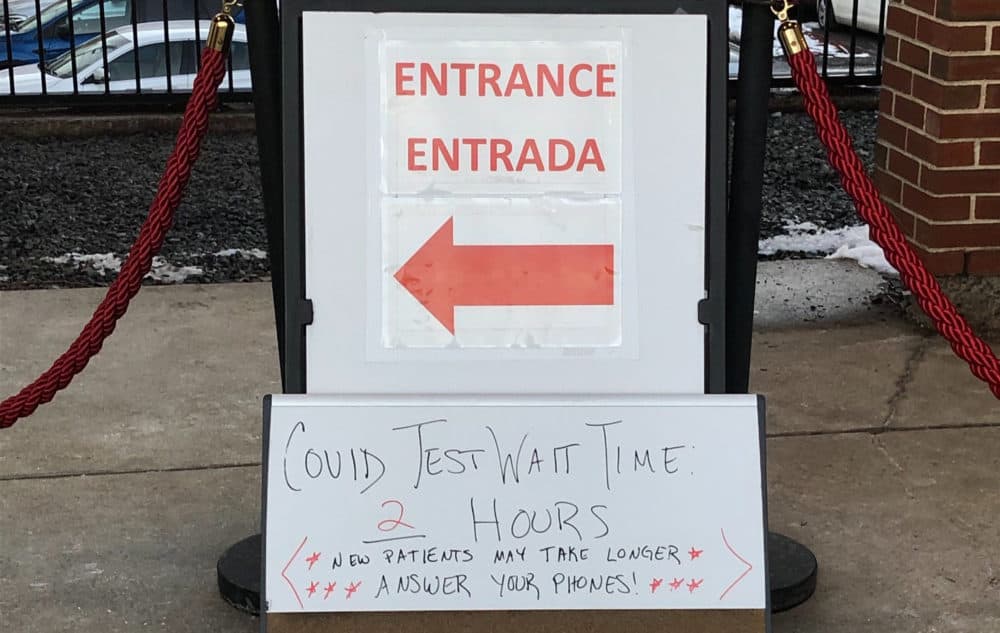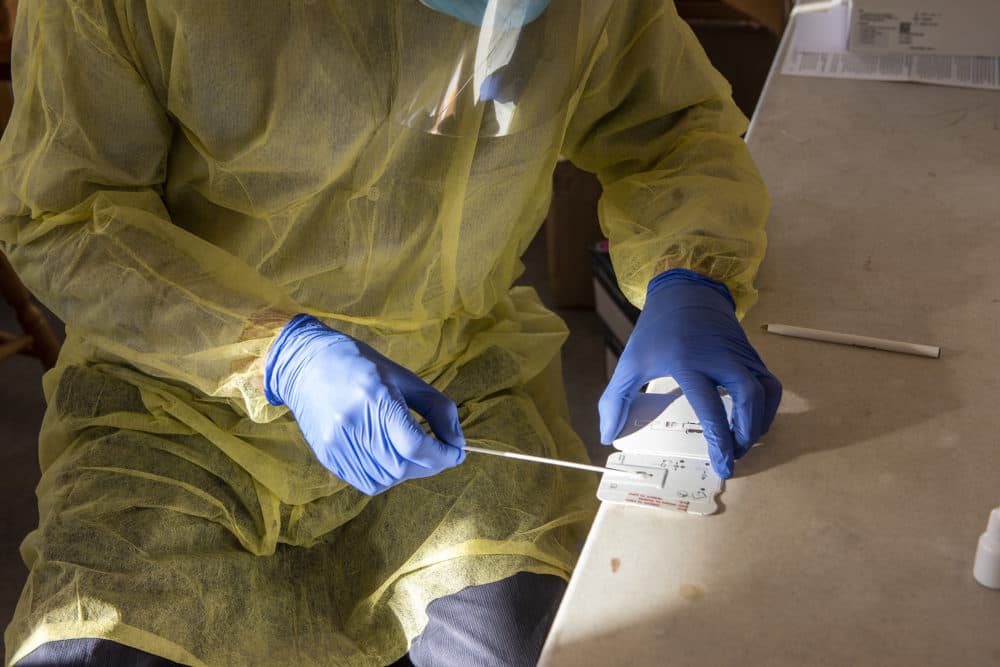Advertisement
Coronavirus Coverage
Vaccines Are Boosting Hope In The Pandemic. But New Worries About Testing Supplies Are Rising
Resume
Amid the celebrating over the recent arrival of the coronavirus vaccine came a sense of dread among some health care providers about a short supply of COVID tests — especially as demand is expected to spike just before the Christmas holiday.
Some health care providers, especially those serving lower-income communities, expressed worries that despite the dramatically changed landscape for testing, widespread and quick testing remains an elusive goal. It's yet another area, they said, in which the pandemic is highlighting societal inequities.
Lou Brady, CEO of Family Health Center of Worcester, said the center is bracing for a spike in testing demand this week — similar to what happened in the days before Thanksgiving when requests for tests jumped 50%. According to Brady, the center averages about 500 tests a week, with a staggering positive rate of about 29%.
"Frequently the people in our communities, they live in multi-person households," Brady said. "They're sharing one bathroom, taking public transportation. They're working in jobs that expose them, they're grocery workers and health care workers.
"So there's a higher level of exposure and more difficulty accessing tests and taking time off to get them," he added. "It's why we feel a deep responsibility to the community to provide this level of testing."
Brady set up an outdoor trailer near the front door of the center just for testing. It holds about a half-dozen partitioned-off areas for patients to get tested with several space heaters inside, he explained. It's almost like a car port with walls — open on each end — with a closed off area at the back for staff and supplies. Even though it's outdoors, it was built with its own ventilation system.
"There's a higher level of exposure [for people in our communities] and more difficulty accessing tests and taking time off to get them."
Lou Brady, CEO of Family Health Center of Worcester
"It's basically a makeshift testing area. And we're grateful for it," Brady said. "We added this trailer to improve flow and create a safer environment for both our staff and our patients."
The whiteboard at the entrance warned of a two-hour wait to get tested, which is about typical, Brady said. What can be even longer is the wait for results. In early December, a person could expect about a 48-hour wait. But just before Thanksgiving, it took as long as six days.
So Brady quickly applied to the state when the governor announced this month that new rapid tests — Abbott Laboratories' BinaxNOW — would be made available. The center was able to get 1,000 of those tests, which it started using this week.
"The BinaxNOW test will be a pressure relief valve going into this holiday season," Brady said. The antigen test provides results in 15 minutes.
However, the rapid antigen tests detect specific proteins in the virus and are considered less accurate than the molecular PCR tests, which are processed in a lab.
Federal regulators granted emergency use authorization for the BinaxNOW test in August. Although rapid tests were designed for symptomatic patients, state guidelines allow for their use in those without symptoms. The center's associate medical director, Jeremy Malin, said the antigen test is effective if done about a week after someone is exposed to COVID.
"The understanding is that the viral loads are similar in both symptomatic versus asymptomatic individuals who are infectious," Malin said. "So that's why we know that we can use this test for asymptomatic individuals, and we're still going to capture those who are infectious."

The state received about a third of the two million BinaxNOW tests it requested from Abbott. State health officials said it's not clear when the company will provide more. Abbott said it's working to fulfill the federal government's order, which will then be distributed to the states. In Massachusetts, the tests were slated to go to nursing homes, schools, homeless shelters and community health centers. Malin said the Worcester Center's 1,000 tests won't go very far, so he's hoping more will come soon.
"At the moment we have supplies to get to January," Malin said. "We have no confirmation that we'll have further shipments from either the state or from Abbott."
Another community health center that hoped the BinaxNOW test would help ease a upcoming holiday testing crunch was the Greater Lawrence Family Health Center (GLFHC). Around Thanksgiving, people there spent as long as four hours waiting in line for a test. Dr. Zandra Kelley, GLFHC's chief medical officer, said the center received about 2,000 BinaxNOW tests from the state to help get more people tested this week.
"I don't think it will necessarily make the lines a lot shorter, but it will at least provide access to those people who may not feel well enough to go wait in line," Kelley said.
But the uncertainty about the BinaxNOW supply prompted at least one other health center to decide against using it, despite worries about testing capacity.
Janice John, medical director of the acute care clinic at the Cambridge Health Alliance in Somerville, said accommodating the new tests would have required too many logistical changes for what might be a short time use of one test.
John also noted wide disparities in testing capabilities, especially when comparing community health centers to large hospitals. John said the state should be prioritizing communities hardest hit by COVID.
"I'm not sure that we should be encouraging everyone to be doing asymptomatic testing and surveillance when we can't even have access for the people in the communities that are actually the highest risk," John said.
The community health centers said they've become resourceful during the pandemic and will try to minimize testing delays for the holidays and the winter, even as they now prepare to administer COVID vaccines scheduled to arrive later this month.
This segment aired on December 21, 2020.
